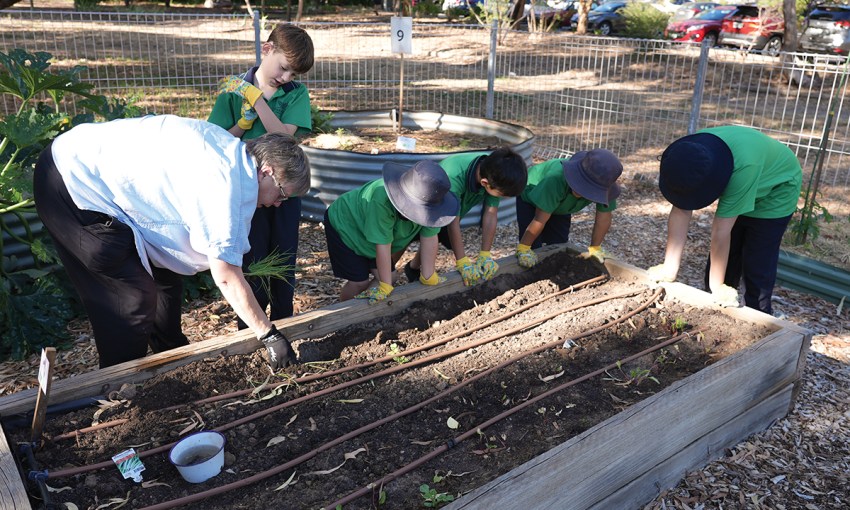Tucked away in the grounds of the aptly named Paradise Primary School is a special green space that is providing a wonderfully rich connection between nature, the students and a dedicated group of residents from the adjacent retirement village.
A slice of paradise
If there’s one thing that’s immediately obvious when you step onto the grounds of Paradise Primary School in Adelaide’s northeast, it’s the strong connection the school community has with its natural environment.
Set on expansive grounds, there are eucalypt groves planted by the first families who came to this school when it opened back in 1978, and some 45 years later, children run and play among the trees and under the shady canopy, where the sight of a bounding kangaroo or sleepy koala is not uncommon.
More than five years ago, the school was keen to have students get their hands dirty and delight in growing plants, but the first efforts at establishing a vegetable garden had mixed results: while all involved were enthusiastic, the barriers of hot weather coupled with school holiday absences, often left new seedlings and maturing plants struggling.
The school’s principal, Karen Alford, started the kitchen garden and despite those initial hurdles remained steadfastly committed to the project and the tangible benefits – both educational and emotional – that would come from growing produce.
So, she convinced her sister-in-law, Lee-Anne, who had an invaluable background in horticulture, to help and vast improvements in the garden were seen.
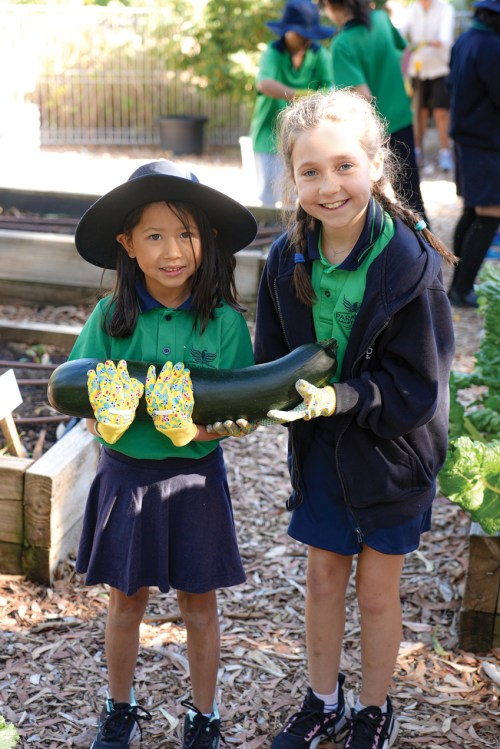
However, more assistance was needed and the solution happened to be right over the fence (quite literally).
That assistance came from the residents of Thorndon Park Estate, an independent living retirement complex comprising 50 units and 70 residents, which borders Paradise Primary.
No different from most retirement villages, Thorndon Park Estate is home to many residents who have moved from large homes and established gardens to smaller accommodation and garden space. As any keen green thumb will attest, once you have sap running through your veins, you are always itching to get some dirt under the fingernails.
So, three years ago, when Paradise Primary reached out to Thorndon Estate for some gardening help, Karyn was amazed and delighted to find immediate responses. The first to put his hand up was resident Graham Douglass, who volunteered to coordinate activities; he was no stranger to working with plants and people, having spent many years involved in the Wynn Vale Community Garden (he was also instrumental in setting up Thorndon Park Estate’s produce garden, too).
Graham still has fond memories of being a student at Glenelg Primary “way back” in Year 5 when he had his first garden experience pushing a spade in the ground, so it seemed a natural fit to extend this love to a new generation.
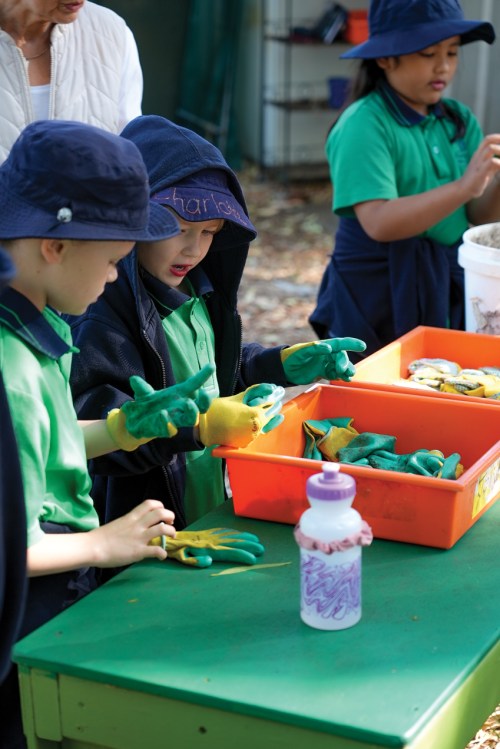
Recruiting a small band of other residents, equally keen to assist, Graham, Karyn, Lee-Anne and the school staff set out developing and upgrading the garden along with designing an intergenerational education program to suit.
Thanks to the help of the local Rotary Club, a fence was installed around the garden’s perimeter to help define and secure the space. The existing raised garden beds, neatly laid out, were topped up with well-aged compost and everything was ready.
While the benefits would be great for all students, there were also benefits for the children recently arrived from overseas. The school has seen increased numbers of children from India and China, along with South Korea, Sri Lanka, Chile and Russia. While the school runs some classes for new arrivals in Punjabi and Hindi, the universal language of gardening has been immensely beneficial.
Tuesday morning is garden class. Like a well-oiled machine, Graham and his band of helpers from Thorndon Estate arrive early, as does Lee-Anne. The garden shed is opened, a table put out, then gloves, trowels and watering cans lined up, before the seedlings to be planted are placed on the soil of the raised garden beds.
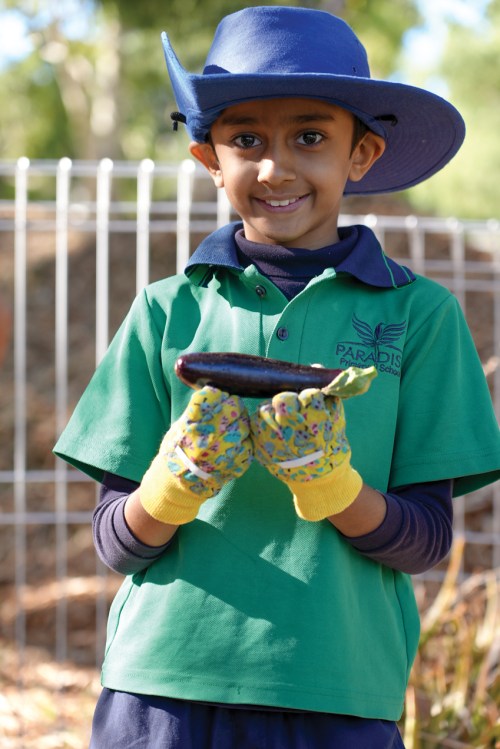
Then one of the junior classes arrives in a shrill of excitement, ready for gloves to go on and the fun and wonder of the lesson to begin.
Gathering around a raised bed, each helper explains to their students what they are going to plant and how. Listening intently to gentle words from those with years of gardening experience, the children are just bursting to get going. Under the watchful gaze of a helper, each student is guided and encouraged to push a trowel into the dirt, carefully squeeze a seedling from its punnet, place into the hole and pat down. A follow-up water ensures the plant is off to a good start. Given the look of concentration on each child’s face as they plant and water, you can appreciate the ownership they develop with this garden.
As Graham says of his and the other volunteers’ thoughts about the program: “Hopefully the time spent planting, watering, feeding and picking will instil a joy of gardening in the children – it’s about getting a successful taste. We love our time here and judging by the looks on their faces, so do they.”
This place is always active with the growing cycle of preparing, planting, nurturing and harvest. Spilling watering cans crisscross beds, as some children finalise their planting, while others search for ripening vegetables, as squeals of excitement explode when a hidden pumpkin or an oversized zucchini is discovered. Understanding where food comes from and the nutritional benefits of eating fresh fruit and vegetables is a core outcome of time spent here.
The goal of any vegetable garden is to be productive, and Paradise Primary’s growing plot is no exception, with harvest from the garden eagerly picked and included in class cooking activities. However, because there is a limit to what the school can use, an option for the excess produce needed to be found and it came in the form of the Salvation Army, who have been delighted to share in the school’s food largesse.
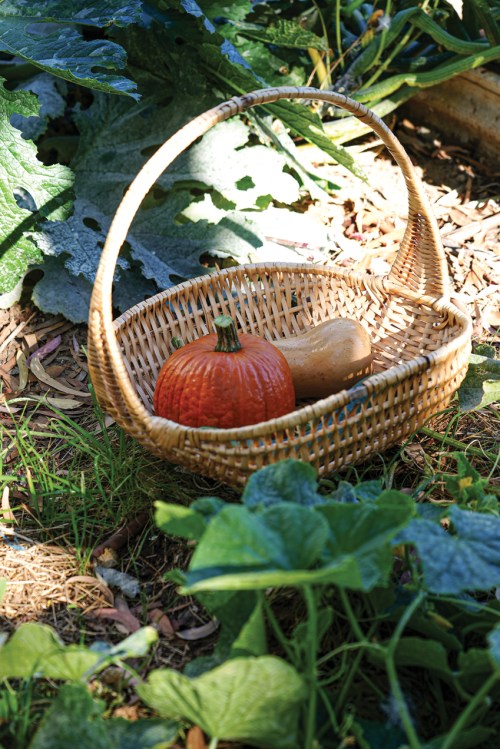
Under the supervision of Claudia Castle – Paradise Primary’s pastoral care worker – excess produce is collected by students weekly, taken back to the classroom, weighed, then delivered to the Salvation Army office for use in their Friday soup kitchen. Pumpkin, capsicum, corn, tomato, and plenty of other produce from the garden has helped enrich that menu.
Recently a bag of Kipfler potatoes donated by Keelan Grain and Fodder was planted in a raised garden bed by the students and it has yielded more than 20 kilograms of spuds. The look of gratitude from the Salvos on receipt of this weighty gift was only surpassed by the wide-eyed wonder of the children as they dug their hands into the soil to pull out a mountain of tubers.
Fulfilling its role as an educational space within the school curriculum, along with its broader community-reach engendering the school moto of “Work Hard, Be Kind, Be Safe”, Paradise Primary’s kitchen garden has become an intergenerational success thanks to the valiant efforts of all involved.
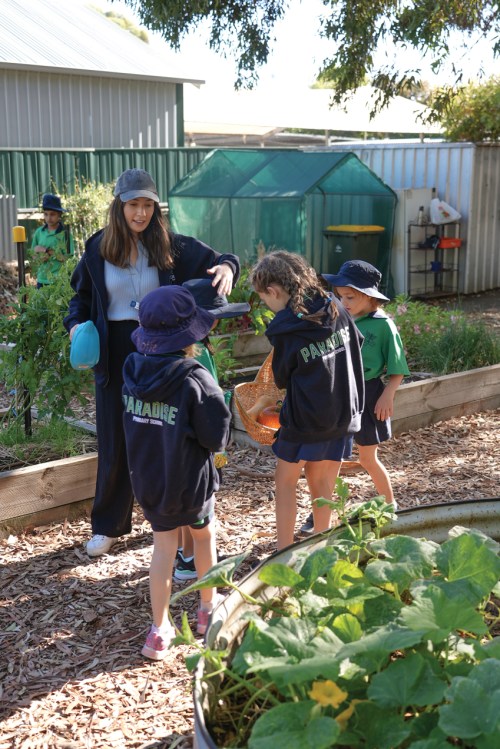
Keys to school garden success
Communication – maintaining a good open relationship between school and volunteers is paramount. Understanding the educational outcomes of the garden within the curriculum and how they are best delivered by all parties.
Core – better to match the workload with the number of volunteers, that way everyone involved will feel they are contributing rather than feeling under-utilised.
Commitment – gardening is a year-round job. Rostering volunteers to check the garden every few days, especially during a heat wave, ensures plants continue to grow and flourish even over a school holiday.
Community – engagement within the school and broader community can reap rewards, whether it be supplying excess produce to a charity or sharing food among the school group.
This article first appeared in the April 2023 issue of SALIFE magazine.
including free delivery to your door.



